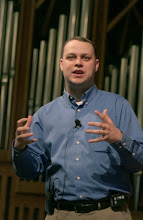Both Ed Stetzer and Thom Rainer have written insightful posts on the research. And while I do not have the years of experience or credentials that they do, here are a few reasons that I as a 31 year old pastor think the trend might be happening:
1. Perceived Lack of Importance - Many of the young leaders with whom I talk mention the fact that there seems to be no real purpose in the meetings. Many of them feel that the convention is a distraction or hindrance to doing effective ministry in their local setting. I have talked recently with people who are men of great character and leadership potential. Our conversation centered on whether they would be attending the convention this year. Their response was "I just don't see any point in going."
2. Perceived Lack of Desire for Our Involvement - One of the conventions mentioned in the report is the 2005 convention in Nashville. One of the events that I was most excited about in the weeks before the convention that year was the Younger Leaders meeting that happened before the convention. While I enjoyed the event, I walked away feeling that again I had been talked to and not heard from. I still felt after that meeting that no "real" attempts were being made to reach out to a younger generation of leaders.
3. Perceived Exclusivity - Part of the real disillusionment with the SBC among younger leaders is the idea that leadership is hand-picked among a select group of individuals. At a recent meeting of young leaders in the Nashville area, we spent a great amount of time talking about how we really wanted to participate, but did not know how to "break into" the group that always seems to lead. The election of Frank Page a couple of years ago may have signaled a change in the SBC, but many younger leaders feel that they do not want to put the effort into the national convention that is needed to "break in" to the groups that select the leadership.
4. Perceived Legalism - I don't know that legalism is the best choice here, but I think it fits. Our generation seems to be much more open to cooperating with people across denominational lines to spread the Gospel than our predecessors. We are more willing to look over issues that are not biblically mandated (although they have been taught as such in our churches for years) but are interpretation choices. We are willing to work with people who are building up the Kingdom. We are not liberal or moderate, but we do feel that we need to cooperate more with Bible believing organizations outside the convention to see people saved.
5. "We keep bombing the rubble" - I am appreciative to the great men of God who fought the battle for the Bible in the mid 80's and early 90's. While I was not there, I have been fortunate to hear the stories of my father-in-law who did attend those meetings. I heard with admiration as he talked about the votes and the battle. But now it seems that we kept on fighting after the battle was won. The quote above comes from a recent discussion with Dr. Jim Henry who captured what many young leaders feel about the convention. Consequently, they feel that they don't want to be a part of a convention that continually fires on one another.
Four of the above reasons start with the word "perceived." The reason for that wording is that there may be real attempts to reach out, but younger leaders do not see it that way. I would argue that there is great importance in our annual meetings, but younger leaders do not see it that way.
I hesitate to post this entry, because I feel like I have only given the problems without offering solutions. I don't have the answers to the trend, but I do think it is a problem that we need to seriously think about in the days ahead.




2 comments:
Thanks for sharing these thoughts. You do a good thing by using the word, "perceive." Nevertheless, perceptions are important and are often indicative of reality. As a "young" leader quickly aging beyond that "bracket," I believe you're right.
Another slice of the convention pie worth considering is that of the smaller churches. Often, the young leaders and small churches overlap, but not always. They are disenfranchised in the same way, though.
I can honestly say that as the demographic that is being discussed, for the longest time I felt that the convention was an archaic link to the past that caused more harm than good. Because the only time that the convention was discussed in our church ws when the battle lines were being drawn. Thus my view on the convention was one of tension. However when we were in Cookeville our pastor was very into it and would give weekly updates on the good the bad and the ugly. He also got the church excited about the work that could be done not by the 500+ in that church but by the thousands of members in the convention. The convention has a much louder voice than just a single church. The convention, I believe, still has a place today and this "younger" generation though needs some help to get onboard.
Post a Comment